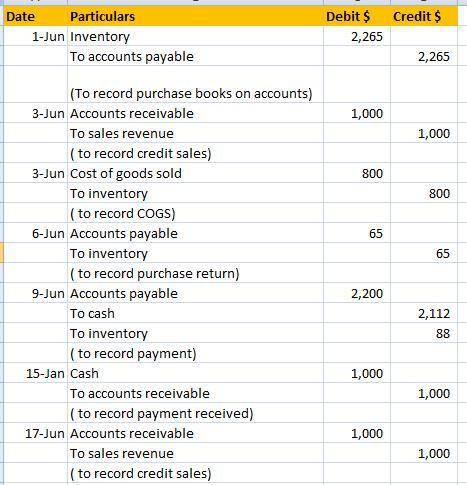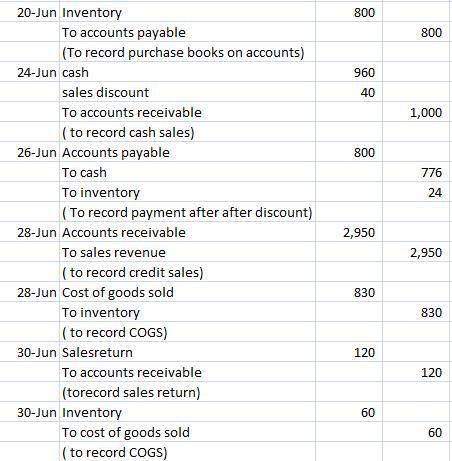
Business, 30.03.2020 16:17 1963038660
Powell Warehouse distributes hardback books to retail stores and extends credit terms of 4/10, n/30 to all of its customers. During the month of June, the following merchandising transactions occurred.
June 1 Purchased books on account for $3,065 (including freight) from Catlin Publishers, terms 4/10, n/30.
3 Sold books on account to Garfunkel Bookstore for $1,000. The cost of the merchandise sold was $850.
6 Received $65 credit for books returned to Catlin Publishers.
9 Paid Catlin Publishers in full.
15 Received payment in full from Garfunkel Bookstore.
17 Sold books on account to Bell Tower for $1,050. The cost of the merchandise sold was $750.
20 Purchased books on account for $700 from Priceless Book Publishers, terms 2/15, n/30.
24 Received payment in full from Bell Tower.
26 Paid Priceless Book Publishers in full.
28 Sold books on account to General Bookstore for $2,600. The cost of the merchandise sold was $750.
30 Granted General Bookstore $260 credit for books returned costing $65.
Journalize the transactions for the month of June for Powell Warehouse, using a perpetual inventory system

Answers: 2


Another question on Business

Business, 22.06.2019 11:00
If the guide wprds on the page are "crochet " and "crossbones", which words would not be on the page. criticize, crocodile,croquet,crouch,crocus.
Answers: 1

Business, 22.06.2019 11:50
After graduation, you plan to work for dynamo corporation for 12 years and then start your own business. you expect to save and deposit $7,500 a year for the first 6 years (t = 1 through t = 6) and $15,000 annually for the following 6 years (t = 7 through t = 12). the first deposit will be made a year from today. in addition, your grandfather just gave you a $32,500 graduation gift which you will deposit immediately (t = 0). if the account earns 9% compounded annually, how much will you have when you start your business 12 years from now?
Answers: 1

Business, 22.06.2019 13:00
Reliability and validity reliability and validity are two important considerations that must be made with any type of data collection. reliability refers to the ability to consistently produce a given result. in the context of psychological research, this would mean that any instruments or tools used to collect data do so in consistent, reproducible ways. unfortunately, being consistent in measurement does not necessarily mean that you have measured something correctly. to illustrate this concept, consider a kitchen scale that would be used to measure the weight of cereal that you eat in the morning. if the scale is not properly calibrated, it may consistently under- or overestimate the amount of cereal that’s being measured. while the scale is highly reliable in producing consistent results (e.g., the same amount of cereal poured onto the scale produces the same reading each time), those results are incorrect. this is where validity comes into play. validity refers to the extent to which a given instrument or tool accurately measures what it’s supposed to measure. while any valid measure is by necessity reliable, the reverse is not necessarily true. researchers strive to use instruments that are both highly reliable and valid.
Answers: 1

Business, 22.06.2019 17:30
You should do all of the following before a job interview except
Answers: 2
You know the right answer?
Powell Warehouse distributes hardback books to retail stores and extends credit terms of 4/10, n/30...
Questions

Mathematics, 20.09.2019 05:00



Business, 20.09.2019 05:00


History, 20.09.2019 05:00


Mathematics, 20.09.2019 05:00





Social Studies, 20.09.2019 05:00

Mathematics, 20.09.2019 05:00

Computers and Technology, 20.09.2019 05:00


Mathematics, 20.09.2019 05:00


Social Studies, 20.09.2019 05:00





